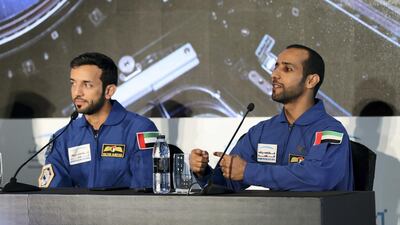The UAE has moved a step closer to enlisting its first female astronaut after 1,400 women signed up for the chance to be launched into space.
A senior space official hailed the high quality of the entrants and said the UAE would like to see a woman take up at least one of two coveted roles in the latest recruitment programme.
Applications have now closed, with 4,305 nationals vying to follow in the footsteps of Maj Hazza Al Mansouri, the first Emirati astronaut who flew into space on September 25, and Sultan Al Neyadi, the mission’s back-up astronaut.
There are about 250 more female entrants than in the last round of applications in 2018.
"Increasing that number is a great step forward," Salem Al Marri, head of the UAE Astronaut Programme, told The National.
“We would definitely like to see a woman get selected. That’s something we would actually encourage.
"What I’ve initially seen from the women that have applied, we’ve got some really good candidates. The quality that we have this time around is really high.
“At the same time, our objective is clear that we will select the best, brightest and most suitable.”
Sheikh Mohammed bin Rashid, Vice President of the UAE and Ruler of Dubai, said on Twitter that he was proud of the desire and passion in those who had applied to join the ranks of the country's growing space sector.
Mr Al Marri said adding women to the astronaut corps would help to add diversity to the programme.
But even if women astronauts were added to the corps, it is not guaranteed that they would go on the next UAE space flight.
The two new astronauts will join Maj Al Mansouri and Dr Al Neyadi in the country's growing space fleet.
Out of the four astronauts, only the one whose profile matches the objective of the mission would be selected to go.
Most of this year's applicants are engineers, pilots, medical professionals and experts in fields of science.
Forty-four per cent of the applicants are from Abu Dhabi, 23 per cent from Dubai, and the rest from the five other emirates, while 130 hold PhDs.
The next challenge for the team at the Mohammed bin Rashid Space Centre is to whittle down the number of applicants to 300.
With the "stay at home" order in place because of the Covid-19 pandemic, the centre will carry out online assessments and interviews with the remaining candidates.
By mid-June, the team hopes to further narrow that number down 120, who will undergo medical, psychological and psychometric tests.
“Then about 80 will be shortlisted and we’ll set up for our first interview panel in September," Mr Al Marri said.
"This will be followed by 40 people, who will be part of our second interview round."
He hopes that face-to-face interviews will be possible by autumn if the Covid-19 risk has been reduced.
“If we are still in a situation where Covid-19 is affecting interviews, obviously that makes it a little more difficult for the assessors and candidates,” Mr Al Marri said.
“But what I’ve learnt by working from home in the past couple of months is that you can do a lot through technology these days and it would be quite interesting to do this remotely.”
The next two astronauts will be revealed in January, 2021.
Details of a new UAE space mission have not yet been announced.
The country used Russia's Soyuz rocket to launch Maj Al Mansouri to the International Space Station for his eight-day stay.
It is unclear whether the UAE has booked any Soyuz seats with Russia for its next mission.
However, Mr Al Marri said space centre is in discussions with “all of the players” who have the ability or the potential to launch.
“We are constantly interacting with them. We are looking at all of the options that we have,” he said.
A human spaceflight is set to be launched from the US on May 27, the first of its kind since the Space Shuttle programme was disbanded in 2011.
Two Nasa astronauts will fly on board Space X’s Crew Dragon spacecraft.

















